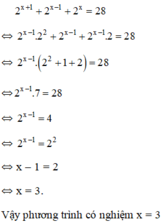Giải các phương trình mũ:
Hãy nhập câu hỏi của bạn vào đây, nếu là tài khoản VIP, bạn sẽ được ưu tiên trả lời.



\(\frac{x^2-4x+1}{x+1}+2=-\frac{x^2-5x+1}{2x+1}\):
\(ĐKXĐ:x\ne-1;x\ne-\frac{1}{2}\)
PT \(\Leftrightarrow\frac{x^2-4x+1}{x+1}+1+\frac{x^2-5x+1}{2x+1}+1=0\)
\(\Leftrightarrow\frac{x^2-3x+2}{x+1}+\frac{x^2-3x+2}{x+1}=0\)
\(\Leftrightarrow\left(x^2-3x+2\right)\left(\frac{1}{x+1}+\frac{1}{2x+1}\right)=0\)
\(\Leftrightarrow\left(x^2-3x+2\right)\left(3x+2\right)=0\Leftrightarrow\left(x-1\right)\left(x-2\right)\left(3x+2\right)=0\)
\(\Leftrightarrow x=1;x=2;x=-\frac{2}{3}\)
Cả 3 giá trị trên đều thỏa mãn ĐKXĐ
Vậy PT đã cho có tập nghiêm : \(S=\left\{1;2;-\frac{2}{3}\right\}\)
Chúc bạn học tốt !!!

a, ĐKXĐ : \(D=R\)
BPT \(\Leftrightarrow x^2+5x+4< 5\sqrt{x^2+5x+4+24}\)
Đặt \(x^2+5x+4=a\left(a\ge-\dfrac{9}{4}\right)\)
BPTTT : \(5\sqrt{a+24}>a\)
\(\Leftrightarrow\left[{}\begin{matrix}\left\{{}\begin{matrix}a+24\ge0\\a< 0\end{matrix}\right.\\\left\{{}\begin{matrix}a\ge0\\25\left(a+24\right)>a^2\end{matrix}\right.\end{matrix}\right.\)
\(\Leftrightarrow\left[{}\begin{matrix}-24\le a< 0\\\left\{{}\begin{matrix}a^2-25a-600< 0\\a\ge0\end{matrix}\right.\end{matrix}\right.\)
\(\Leftrightarrow\left[{}\begin{matrix}-24\le a< 0\\0\le a< 40\end{matrix}\right.\)
\(\Leftrightarrow-24\le a< 40\)
- Thay lại a vào ta được : \(\left\{{}\begin{matrix}x^2+5x-36< 0\\x^2+5x+28\ge0\end{matrix}\right.\)
\(\Leftrightarrow-9< x< 4\)
Vậy ....
b, ĐKXĐ : \(x>0\)
BĐT \(\Leftrightarrow2\left(\sqrt{x}+\dfrac{1}{2\sqrt{x}}\right)< x+\dfrac{1}{4x}+1\)
- Đặt \(\sqrt{x}+\dfrac{1}{2\sqrt{x}}=a\left(a\ge\sqrt{2}\right)\)
\(\Leftrightarrow a^2=x+\dfrac{1}{4x}+1\)
BPTTT : \(2a\le a^2\)
\(\Leftrightarrow\left[{}\begin{matrix}a\le0\\a\ge2\end{matrix}\right.\)
\(\Leftrightarrow a\ge2\)
\(\Leftrightarrow a^2\ge4\)
- Thay a vào lại BPT ta được : \(x+\dfrac{1}{4x}-3\ge0\)
\(\Leftrightarrow4x^2-12x+1\ge0\)
\(\Leftrightarrow x=(0;\dfrac{3-2\sqrt{2}}{2}]\cup[\dfrac{3+2\sqrt{2}}{2};+\infty)\)
Vậy ...



a) Tam thức bậc hai \(f\left( x \right) = 2{x^2} - 15x + 28\) có hai nghiệm phân biệt là \({x_1} = \frac{7}{2};{x_2} = 4\)
và có \(a = 2 > 0\) nên \(f\left( x \right) \ge 0\) khi x thuộc hai nửa khoảng \(\left( { - \infty ;\frac{7}{2}} \right];\left[ {4; + \infty } \right)\)
Vậy tập nghiệm của bất phương trình \(2{x^2} - 15x + 28 \ge 0\) là \(\left( { - \infty ;\frac{7}{2}} \right] \cup \left[ {4; + \infty } \right)\)
b) Tam thức bậc hai \(f\left( x \right) = - 2{x^2} + 19x + 255\) có hai nghiệm phân biệt là \({x_1} = - \frac{{15}}{2};{x_2} = 17\)
và có \(a = - 2 < 0\) nên \(f\left( x \right) > 0\) khi x thuộc khoảng \(\left( { - \frac{{15}}{2};17} \right)\)
Vậy tập nghiệm của bất phương trình \( - 2{x^2} + 19x + 255 > 0\) là \(\left( { - \frac{{15}}{2};17} \right)\)
c) \(12{x^2} < 12x - 8 \Leftrightarrow 12{x^2} - 12x + 8 < 0\)
Tam thức bậc hai \(f\left( x \right) = 12{x^2} - 12x + 8\) có \(\Delta = - 240 < 0\) và \(a = 12 > 0\)
nên \(f\left( x \right) = 12{x^2} - 12x + 8\) dương với mọi x
Vậy bất phương trình \(12{x^2} < 12x - 8\) vô nghiệm
d) \({x^2} + x - 1 \ge 5{x^2} - 3x \Leftrightarrow -4{x^2} + 4x - 1 \ge 0\)
Tam thức bậc hai \(f\left( x \right) = -4{x^2} + 4x - 1\) có \(\Delta = 4^2 - 4.(-4).(-1)\)
Do đó tam thức bậc hai có nghiệm kép \({x_1} = {x_2}= \frac{1}{2}\) và a = - 4 < 0
Vậy bất phương trình \({x^2} + x - 1 \ge 5{x^2} - 3x\) có tập nghiệm S = {\(\frac{1}{2}\)}

\(\frac{\left(x-2\right)^2}{12}-\frac{\left(x+1\right)^2}{21}=\frac{\left(x-4\right)\left(x-6\right)}{28}\)
\(\Leftrightarrow\frac{7\left(x-2\right)^2}{84}-\frac{4\left(x+1\right)^2}{84}=\frac{3\left(x-4\right)\left(x-6\right)}{84}\)
\(\Leftrightarrow7\left(x-2\right)^2-4\left(x+1\right)^2=3\left(x-4\right)\left(x-6\right)\)
\(\Leftrightarrow7\left(x^2-4x+4\right)-4\left(x^2+2x+1\right)=3\left(x^2-10x+24\right)\)
\(\Leftrightarrow7x^2-28x+28-4x^2-8x-4=3x^2-30x+72\)
\(\Leftrightarrow7x^2-4x^2-3x^2-28x-8x+30+28-4-72=0\)
\(\Leftrightarrow-6x-48=0\)
\(\Leftrightarrow-6x=48\)
\(\Leftrightarrow x=-8\)
Vậy tập nghiệm của PT là : \(S=\left\{-8\right\}\)
Chúc bạn học tốt !!!
\(\(\frac{\left(x-2\right)^2}{12}-\frac{\left(x+1\right)^2}{21}=\frac{\left(x-4\right)\left(x-6\right)}{28}\)\)
\(\Leftrightarrow\frac{7\left(x^2-4x+4\right)}{84}-\frac{4\left(x^2+2x+1\right)}{84}=\frac{3\left(x^2-6x-4x+24\right)}{84}\)
\(\Rightarrow7x^2-28x+28-4x^2-8x-4=3x^2-30x+\frac{72}{ }\)
\(\Leftrightarrow3x^2-36x+24=3x^2-30x+72\)
\(\Leftrightarrow-6x=48\Leftrightarrow x=-8\)

a: ĐKXĐ: \(x\in R\)
\(\sqrt{x^2+6x+9}=2x+1\)
=>\(\left|x+3\right|=2x+1\)
=>\(\left\{{}\begin{matrix}x>=-\dfrac{1}{2}\\\left(2x+1\right)^2=\left(x+3\right)^2\end{matrix}\right.\Leftrightarrow\left\{{}\begin{matrix}x>=-\dfrac{1}{2}\\\left(2x+1-x-3\right)\left(2x+1+x+3\right)=0\end{matrix}\right.\)
=>\(\left\{{}\begin{matrix}x>=-\dfrac{1}{2}\\\left(x-2\right)\left(3x+4\right)=0\end{matrix}\right.\Leftrightarrow x=2\)
\(\sqrt{x^2+6x+9}=2x-1\\ \Leftrightarrow\sqrt{\left(x+3\right)^2}=2x-1\\ \Leftrightarrow\left|x+3\right|=2x-1\\ TH_1:x\ge-3\\ x+3=2x-1\Leftrightarrow-x=-4\Leftrightarrow x=4\left(tm\right)\\ TH_2:x< -3\\ -x-3=2x-1\Leftrightarrow-3x=2\Leftrightarrow x=-\dfrac{2}{3}\left(tm\right)\)
Vậy \(S=\left\{-\dfrac{2}{3};4\right\}\)
